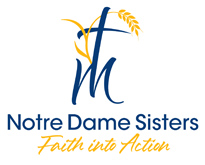Sr. Mary Ann Zimmer: Reflecting on Life in an International Congregation
by Sr. Mary Ann Zimmer, ND
For me one of the great blessings of being a Notre Dame Sister is belonging to an international congregation. It takes us outside our own little world and makes us look at things from multiple points of view. We experience the caring of our Sisters from other provinces who try so hard to understand and support us. We are reminded that we are not the center of the universe! And we have had unbelievable experiences because of these links.
Our rule requires us to send delegates from each province to a meeting every six years to make decisions about our way of life and to meet and bond with each other. All of this was disrupted by World War II and no Sisters from the U.S. were able to attend after 1936 when all such meetings were suspended. All international meetings were impossible during and after World War II. The last chapter they attended was 1936. There was one in 1946 but the U.S. sisters could not travel to post-war Europe.
Mother Vlasta, the Czech Sister who was our international superior, was a brilliant negotiator. In 1968, she succeeded in convincing the Communist government to give visas to our delegates so that we could meet the requirements of our order’s rule. Needing to follow the rule was understandable to the Communists and she was able to use their rigid attitude about rules for her own purposes! She was relentless and was finally able to wear them down and win permission to meet.
After 1968, for almost three decades, these trips took place while the sisters in Czechoslovakia were living behind the Iron Curtain. The Czech and Slovak sisters could not get out, so the delegates from the Bavarian and U.S. provinces went to them. Going into Czechoslovakia at this time was stressful. Especially in the first years, the Sister delegates reported that their luggage was carefully searched by hostile guards and sometimes items were confiscated, transistor radios or books—one never really knew what could be a problem.
We were perfectly confident in the wisdom and skill of the Sisters in managing their situation and taking care of us, but it could be tense. In 1968 the meeting was just ending as the Soviet troops were coming across the borders to put down the Prague Spring, a brief period of more humane governance. The U.S. Sisters were already out but this episode was deeply traumatic for the Bavarian sisters who were not able to get out immediately.
While we were with the Sisters, we were instructed to trust no one, not even members of other religious communities or priests unless the Sisters told us they were safe. You could be talking to a government agent or to a trustworthy bishop working as a gardener. All our conversations other than with our own Sisters were limited to how beautiful the country was and how lovely the people are. Many of the activities of the Sisters were illegal. They were secretly receiving and training new members, supporting dissidents, and providing support to religious education “camping trips” organized by the local Lutheran pastor. They commissioned religious art for their homes from artists who were boycotted for not employing the approved style of representation.
For me these trips led to some of the most touching and the most hilarious experiences of my life. I will never forget standing in the Czech Sisters’ dining room where we had carefully closed all the doors and windows. Together we sang the Czech national anthem when it was illegal to do so.
On the other hand, I get the giggles to this day as I remember the U.S. delegation driving up to a rural bus shelter or disappearing into an airport restroom in our jeans and emerging in the full habit. The government was pressuring the Sisters in Czechoslovakia to take off their habits and we were not going to make trouble by appearing without them. We used to say that we had to elect chapter delegates by dress size to fit the habits we had on hand.
The Sisters we met had amazing lives. In 1950, after having survived the Nazi take over of World War II, the Sisters were once again subjected to a totalitarian and oppressive regime when they were subjected to communism. They were removed from their ministry in schools, orphanages, language and music training, businesses schools, and a teachers’ college. We heard the grim but defiant stories from the Sisters who were relocated to farms and factories and separated from their superiors and more experienced Sisters. Young men were employed to woo them away from their vocation and sexual harassment was frequent. In some remote towns they were housed in army barracks abandoned after the war.
It was a testament to Mother Vlasta’s skill in negotiations that she was able to move the Sisters out of the worst living conditions as soon as possible. She was a remarkable, holy woman! She was the only higher superior who did not go to prison. She was able to call on a relationship with an official who had been aided by the Sisters earlier in their life. This unexpected benefit kept her free and able to travel clandestinely to visit the younger Sisters in their factory dormitories. One nun looked like every other to the officials and Mother was free to encourage and bolster the Sisters the Communists were trying to isolate.
In November 1989, the communist government ceded power and in June 1990 democratic elections were held.
